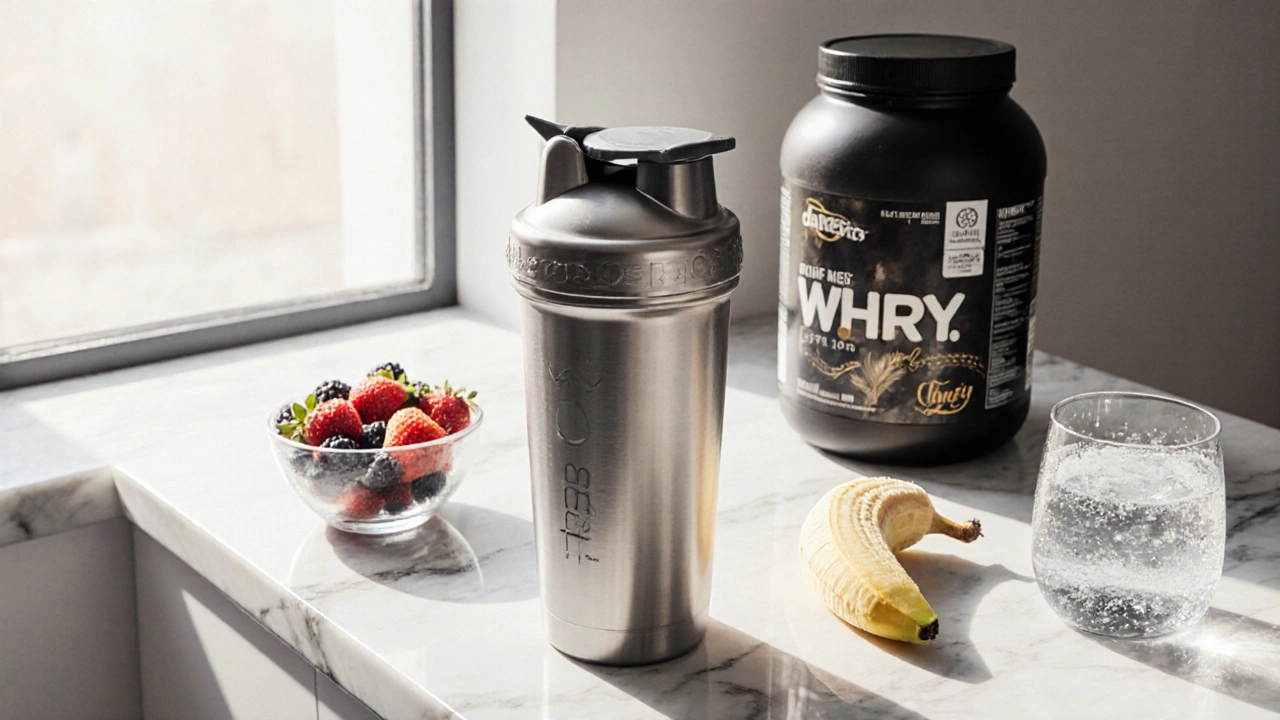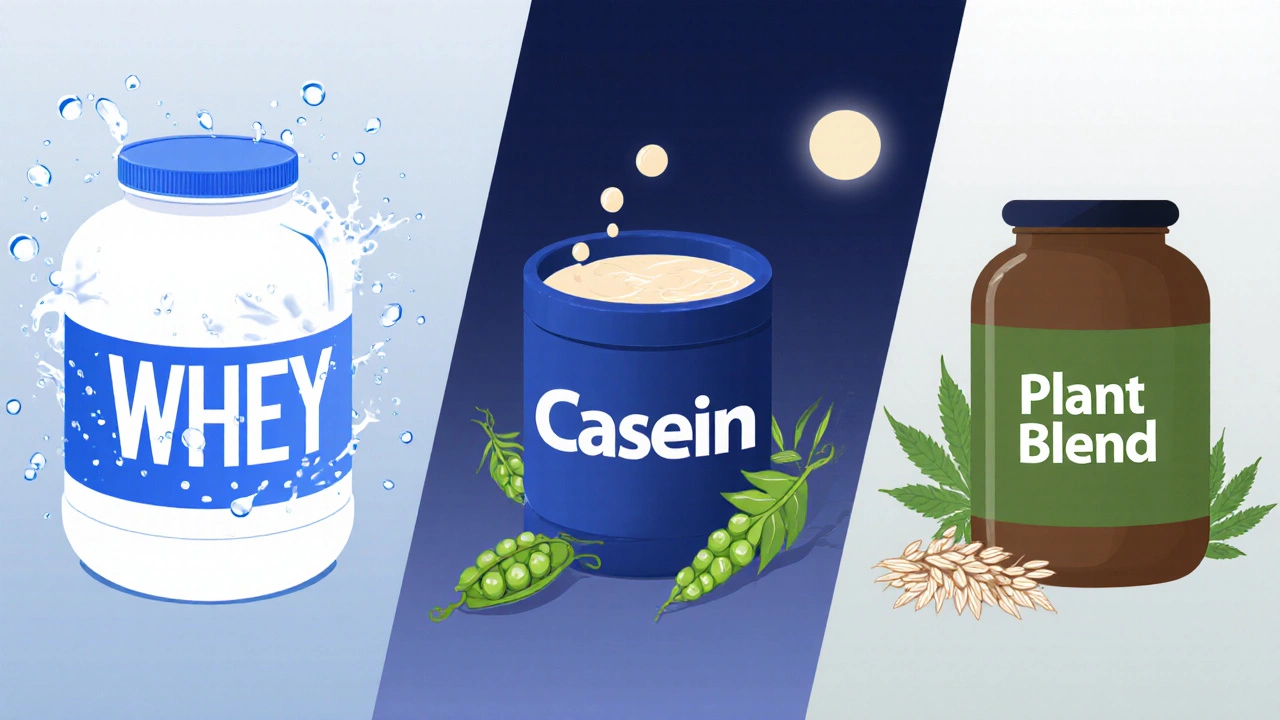Can I Drink a Protein Shake Every Day? Benefits, Risks & Practical Tips

Protein Shake Calculator
Protein Needs Calculator
Key Takeaways
- A protein shake can fit into a daily routine when it matches your personal protein goals.
- Choose the right protein type - whey, casein, or plant - based on timing, digestion, and dietary preferences.
- Most healthy adults can safely consume a shake daily, but people with kidney disease or specific allergies should consult a professional.
- Watch total calories and sugar; a shake isn’t a free pass to ignore whole‑food nutrition.
- Timing matters: post‑workout, before bed, or as a meal‑replacement each serve a different purpose.
When you ask, Protein shake is a blended beverage that typically combines powdered protein, liquid, and optional add‑ins to help meet daily nutrition goals. People often wonder if they can sip one every day. The short answer is yes, protein shake can be part of a balanced diet, but the devil is in the details - how much, which type, and what else you’re eating.
What Exactly Is a Protein Shake?
A protein shake is more than just a flavored milk drink. It’s a delivery system for high‑quality protein, vitamins, minerals, and sometimes added carbs or fats. The core component is the protein powder, which comes from several sources. Below are the most common:
- Whey protein is a fast‑digesting protein derived from milk, rich in essential amino acids.
- Casein protein is the slower‑digesting counterpart, also dairy‑based, often used at night.
- Plant‑based protein blends peas, rice, hemp, or soy to suit vegans and those with dairy intolerance.
Most commercial mixes also contain sweeteners, thickeners, and micronutrients to make the drink palatable and nutritionally complete.
How Much Protein Do You Really Need?
Understanding your Daily protein requirement is the first step before adding any supplement. The general guideline for active adults is 1.2‑2.0 grams per kilogram of body weight per day. For example, a 75 kg (165 lb) person aiming for muscle growth might target around 150 g of protein daily.
If your regular meals already supply 110 g, a 25‑30 g shake fills the gap without excess. The key is to total the protein from food + shakes, not to chase an arbitrary number.

Why Some People Drink a Protein Shake Every Day
Consistent protein intake supports Muscle protein synthesis, the process that builds and repairs muscle fibers after stress. Daily shakes can help in four main ways:
- Convenient protein boost - especially after workouts when muscles are most receptive.
- Meal‑replacement flexibility - a balanced shake can substitute a quick breakfast or lunch on busy days.
- Weight‑management aid - protein increases satiety, reducing snacking.
- Nutrient timing - certain types (e.g., whey) work best post‑exercise, while casein supports overnight recovery.
Potential Risks and Who Should Be Cautious
For most healthy adults, a daily shake is safe. However, there are a few conditions that merit a closer look:
- Kidney function can be strained if protein intake vastly exceeds needs, especially in people with pre‑existing kidney disease.
- People with lactose intolerance may react to whey or casein unless they choose isolate forms or plant‑based alternatives.
- Excess calories from flavored shakes can unintentionally cause weight gain if not accounted for in the total daily budget.
- Some individuals experience digestive upset (bloating, gas) from certain protein types or added fibers.
If any of these apply, a quick chat with a dietitian or GP can set safe limits.
Choosing the Right Protein Type
The three main protein powders each have strengths. The table below summarizes the differences.
| Protein Source | Absorption Speed | Ideal Use | Key Pros | Key Cons |
|---|---|---|---|---|
| Whey (concentrate/isolates) | Fast (20‑30 min) | Post‑workout, quick meals | High leucine, complete amino profile | Lactose in concentrate, short satiety |
| Casein | Slow (6‑8 h) | Before bed, between meals | Prolonged amino release, very filling | Thicker texture, higher calorie per serving |
| Plant blend (pea‑rice‑hemp) | Medium (30‑45 min) | Vegan diets, allergy‑friendly | Free of dairy, often enriched with BCAAs | May lack some essential amino acids unless fortified |
Pick the type that lines up with your schedule, dietary restrictions, and taste preferences.

Practical Guidelines: How to Use a Protein Shake Daily
- Calculate your total protein target (e.g., 1.6 g/kg).
- Track protein from meals; note the shortfall.
- Choose a powder that matches the timing you need (whey for after gym, casein for night).
- Mix 20‑30 g of powder with water, milk, or a plant‑based liquid. Add fruit or nut butter for extra carbs/fats if using as a meal replacement.
- Watch overall calories. A typical 250‑ml shake ranges from 120‑250 kcal.
- Stay hydrated. Protein metabolism requires water.
Consistency beats perfection. If you miss a day, simply resume the next day - your body won’t reset.
Debunking Common Myths
Myth 1: Protein shakes automatically cause weight gain.
Reality: Weight gain occurs only when total calories exceed expenditure. A shake can replace a higher‑calorie snack, actually helping maintain a calorie deficit.
Myth 2: All protein shakes damage kidneys.
Reality: Healthy kidneys handle normal dietary protein without issue. Problems arise only in the context of existing kidney disease and excessive intake.
Myth 3: You need a shake every single day to see results.
Reality: Consistency over weeks matters more than daily dosing. If your meals already meet protein needs, a shake is optional.
Quick FAQ
Can I drink a protein shake on rest days?
Yes. Your muscles still repair and grow on rest days, and a moderate‑protein shake can help meet daily targets without extra calories.
How many shakes per day are safe?
One to two shakes are typical. More than that usually means you’re surpassing protein needs and adding unnecessary calories.
Is whey better than plant protein?
Whey has a higher leucine content, which speeds muscle synthesis. Plant blends are great for vegans or those with dairy sensitivities; choose a fortified mix to close any amino‑acid gaps.
Will a nightly casein shake prevent muscle loss while I sleep?
Yes, casein’s slow release supplies amino acids throughout the night, supporting recovery and reducing overnight catabolism.
Do protein shakes replace whole foods?
No. Whole foods provide fiber, phytonutrients, and micronutrients that most powders lack. Use shakes as a supplement, not a substitute.
Bottom line: If you align the shake’s protein amount with your personal goals, choose the right source, and keep an eye on total calories, drinking a protein shake every day can be a smart, low‑effort way to support fitness, recovery, and nutrition.